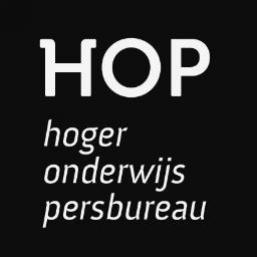
Discussion: How do university and college newspapers remain independent?
It is sometimes painful for administrators when journalists from their own university or college bring wrongdoing to the surface. But censorship is obviously not a solution, a gathering of journalists agreed.
Why are university and college newspapers so important and why must they be independent? In Utrecht, five panelists sat in a row, facing an audience of stakeholders. About half of the audience works at a university or college magazine, the others sit on editorial boards or are freelancers, for example.
The panelists were there at the invitation of the journalists’ union NVJ and the science journalism association VWN, who are witnessing a “worrisome trend.” They are sounding the alarm after a series of incidents in which the freedom of media in higher education has come under pressure.
Watchdog
Social scientist Linda Duits, who has written columns for the Amsterdam university magazine Folia, among others, kicks off the discussion. Universities are large, powerful institutions, and it used to be that a system of co-determination and independent journals could check their power. “That has all crumbled,” she argues. “Journalism should serve a watchdog function, but you can only be a watchdog if you are not paid by your boss, otherwise you will not bite.” She speaks of a “sick, dictatorial construct.”
The incidents are legion. In Eindhoven, the university magazine's website was taken offline when an article about the rector’s conflict of interest was blocked and the editor-in-chief was sidelined. Editor Bridget Spoor, also on the panel, is even embroiled in a whistleblower case.
Several college media outlets must fight for their freedom. Recently, the Rotterdam magazine Profiles was placed under the communications department. We would rather not have made that switch, the editor-in-chief wrote in a comment. Earlier, an incident at the Hogeschool van Arnhem en Nijmegen made the national press. An interim manager of the communications department was annoyed by a column about “bullshit jobs” at the college and had his own reaction posted above that column on the website.
Less gloomy
“You have to keep in mind that we are paid by the university,” acknowledged Willem Andree, Editor-in-Chief of the Wageningen University magazine Resource. “You have to count yourself lucky if the board understands that the university needs a burr under their saddle.” In Wageningen, in his view, that is the case.
Financial dependence need not be a problem, believes Editor-in-Chief Ries Agterberg of Utrecht, who is in the audience. Above all, you have to get it right. “The NOS newsreel is also financed by the state.”
Agterberg also disputes that things are so bad, saying “I am a little less gloomy.” Lately, in fact, there have been all kinds of great examples of science journalism in higher education.
For example, the magazine Delta showed how the Delft University of Technology unintentionally cooperated with the Chinese army and Ad Valvas brought to the surface all that went wrong at the faculty of psychology.
“I'm not so dissatisfied, either,” says Delta Editor-in-Chief Saskia Bonger. “It is difficult at times, but it’s also fun.” Administrators may occasionally evade questions, but it's hard to complain about that, according to her, because they all do it.
Reputation manager
And yet sometimes things do go wrong. Editor Bridget Spoor (Cursor) does not feel independent, she says. A three-part piece on social safety became a two-part piece because the third part was censored. And the editorial board that was supposed to support them? “The chairperson was a reputation manager,” Spoor says. A roar of laughter ripples across the little room.

The danger of self-censorship always lurks, but it is not just in higher education. One of the discussion leaders, science journalist Ronald Veldhuizen, mentions articles about farmers or motorcycle gangs. You quickly become a little more cautious, he feels.
Good bylaws
What needs to be done? Independence must be guaranteed, for example, with good bylaws and expert editorial boards. According to Mark Reid of the Leiden University magazine Mare, professors should be allowed on these boards. They are not afraid to speak out if the board is being difficult.
It should be regulated by law, says Linda Duits. Administrators will always say they consider independence important, but you shouldn't rely on it, she believes.
And do not forget about distribution. Magazines used to be available on stands everywhere, but many now only exist online. According to Duits, that is also a form of censorship, especially if the news is not sent to students and staff.
Solidarity
Erasmus Magazine editor Elmer Smaling thinks editors should also show more solidarity among themselves. When Cursor went offline, all the other websites in higher education could have also gone offline, he says. “But we could not pull that off.”
The magazines can defend themselves if they stick together, though, believes Editor-in-Chief Paul Disco of HvanA, the magazine of the Hogeschool van Amsterdam. “Everything is insured at universities and colleges, except their reputation.” He has also been called to account on occasion and does not think it is a big deal. But if freedom is really at stake, the magazines could engage with each other more quickly “to really create a problem for the board in question.”
Higher education also has a Circle of Editors-in-Chief who represent the interests of higher education media. Willem Andree (Resource) is its chairperson. The Circle sent a critical letter to the Eindhoven University of Technology when the conflict with the editors there broke out.
Educator
More topics, ideas, and insights came up. There were hardly any dissenting voices. There was no director in the room and there was only one spokesperson. His main complaint was that journalists sometimes copy his press releases verbatim and then put their own name underneath.
The NVJ and VWN are not letting the issue go for now. The union is investigating the statutes and wants to support editors in their independence. The Circle of Editors-in-Chief is also scrutinizing the statutes.

